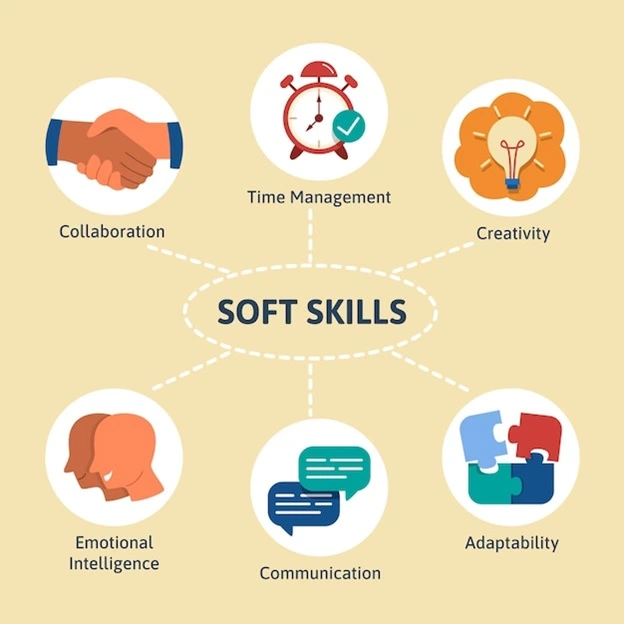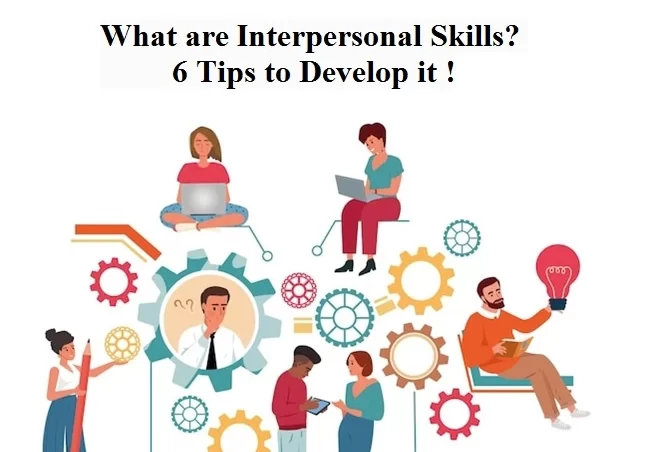
Interpersonal skills are those essential skills involved in dealing with and relating to other people, largely on a one- to-one basis. Lets see What are the Interpersonal Skills? 6 Tips to Develop Interpersonal Skills
Define Interpersonal Skills ?
- Interpersonal skills are the skills we use every day when we communicate and interact with other people, both individually and in groups.
- Through awareness of how you interact with others, and with practice, you can improve your interpersonal skills. This section of Skills You Need is full of information and practical advice that you can use to improve and develop your interpersonal skills
What are examples of Interpersonal Skills ?
Interpersonal skills are also sometimes referred to as social skills, people skills, soft skills, or life skills. Although all these terms can include interpersonal skills, they tend to be broader and may therefore also refer to other types of skills. Many people also use the term communication skills for interpersonal skills, but interpersonal skills cover more, including decision-making and problem-solving, plus working in a group or team and emotional intelligence.
What are the Interpersonal Skills?

Interpersonal skills are generally considered to include a wide range of skills, such as:
- Communication skills, which in turn covers: Verbal Communication – what we say and how we say it; Non-Verbal Communication – what we communicate without words, for example through body language, or tone of voice; and o Listening Skills – how we interpret both the verbal and non-verbal messages sent by others.
- Emotional intelligence – being able to understand and manage your own and others’ emotions.
- Team-working – being able to work with others in groups and teams, both formal and informal.
- Negotiation, persuasion and influencing skills – working with others to find a mutually agreeable (Win/Win) outcome. This may be considered a subset of communication, but it is often treated separately.
- Conflict resolution and mediation – working with others to resolve interpersonal conflict and disagreements in a positive way, which again may be considered a subset of communication.
- Problem solving and decision-making – working with others to identify, define and solve problems, which includes making decisions about the best course of action.
What are the Interpersonal Skills importance?
The Importance of Interpersonal Skills
- Interpersonal skills matter because none of us lives in a bubble.
- In the course of our lives, we have to communicate with and interact with other people on a daily if not hourly basis, and sometimes more often.
- Good interpersonal skills ‘oil the wheels’ of these interactions, making them smoother and pleasanter for all those involved. They allow us to build better and longer-lasting relationships, both at home and at work.
- People with strong interpersonal skills are often more successful in both their professional and personal lives. Interpersonal skills include a wide variety of skills, though many are centred around communication, such as listening, questioning and understanding body language. They also include the skills and attributes associated with emotional intelligence or being able to understand and manage your own and others’ emotions.
- People with good interpersonal skills tend to be able to work well in a team or group, and with other people more generally. They are able to communicate effectively with others, whether family, friends, colleagues, customers or clients. Interpersonal skills are therefore vital in all areas of life at work, in education and socially.
6 Tips to Develop Interpersonal Skills

Improving and developing your interpersonal skills is best done in steps, starting with the most basic, but vital: Lets see the tips to Develop Interpersonal Skills
1. Identify areas for improvement
- The first step towards improving is to develop your knowledge of yourself and your weaknesses.
- You may already have a good idea of areas that you need to develop. However, it is worth seeking
- feedback from other people, because it is easy to develop ‘blind spots’ about yourself.
2. Focus on your basic communication skills
- Communication is far more than the words that come out of your mouth.
- Some would even go so far as to suggest that there is a reason why you have two ears and one mouth, and that you should therefore listen twice as much as you talk!
Interpersonal Skills and Communication
- Listening is very definitely not the same as hearing. Perhaps one of the most important things you can do for anyone else is to take the time to listen carefully to what they are saying, considering both their verbal and non-verbal communication. Using techniques like questioning and reflection demonstrates that you are both listening and interested.
- When you are talking, be aware of the words you use. Could you be misunderstood or confuse the issue? Practice clarity and learn to seek feedback or clarification to ensure your message has been understood. By using questions effectively, you can both check others’ understanding, and also learn more from them.
- You may think that selecting your words is the most important part of getting a message across, but nonverbal communication actually plays a much bigger part than many of us are aware.
- Some experts suggest that around three-quarters of the ‘message’ is communicated by non-verbal signals such as body language, tone of voice, and the speed at which you speak.
- These non-verbal signals reinforce or contradict the message of our words and are much harder to fake than words. They are therefore a much more reliable signal and learning to read body language is a vital part of communication.
3. Improve your more advanced communication skills
- Once you are confident in your basic listening and verbal and non-verbal communication, you can move onto more advanced areas around communication, such as becoming more effective in how you speak, and understanding why you may be having communication problems.
Interpersonal Skills and Communication
Communication is rarely perfect and can fail for a number of reasons. Understanding more about the various barriers to good communication means that you can be aware of—and reduce the likelihood of— ineffective interpersonal communication and misunderstandings. Problems with communication can arise for a number of reasons, such as:
- Physical barriers, for example, being unable to see or hear the speaker properly, or language difficulties;
- Emotional barriers, such as not wanting to hear what is being said, or engage with that topic; and
- Expectations and prejudices that affect what people see and hear.
There are also circumstances in which communication is more difficult: for example, when you have to have an unpleasant conversation with someone, perhaps about their standard of work. These conversations may be either planned or unplanned.There tend to be two issues that make conversations more difficult: emotion, and change.
- Various emotions can get in the way of communicating, including anger and aggression, or stress.
- Few of us are able to communicate effectively when we are struggling to manage our emotions, and sometimes the best thing that can be done is to postpone the conversation until everyone is calmer.
- Difficult conversations are often about the need for change. Many of us find change hard to manage, especially if it is associated with an implied criticism of existing ways of working.
4. Look inwards
- Interpersonal skills may be about how you relate to others, but they start with you. Many will be improved dramatically if you work on your personal skills.
- For example, people are much more likely to be drawn to you if you can maintain a positive attitude. A positive attitude also translates into improved self-confidence.
5.Use and practice your interpersonal skills
- There are a number of situations in which you need to use interpersonal skills.
- Consciously putting yourself in those positions, and practising your skills, then reflecting on the outcomes, will help you to improve.
6.Reflect on your experience and improve
- The final, but by no means least important, element in developing and improving your skills is to develop the habit of self-reflection.
- Taking time to think about previous conversations and other interpersonal interactions will enable you to learn from your mistakes and successes and continue to develop. You might, for example, find it helpful to keep a diary or learning journal and write in it each week.
LIKE WHAT YOU’RE READING?
CHECK OUT SOME OF OUR OTHER GREAT CONTENT HERE:
- HOW TO IMPROVE COMMUNICATION SKILLS?
- LEARN THE ART OF TIME MANAGEMENT
- LEARN THE ART OF NEGOTIATION
- LEARN THE ART OF PERSUASION SKILL
- THE ART OF PUBLIC SPEAKING (STEP BY STEP GUIDE)
- LEARN THE ART OF LEADERSHIP SKILLS
- LEARN PROBLEM SOLVING SKILLS
- PERSONALITY DEVELOPMENT TIPS
- TOP SKILLS EVERY ENTREPRENEUR SHOULD HAVE
- BEST MOTIVATIONAL QUOTE FOR SUCCESS IN LIFE
- 10 TIPS ON HEALTHY LIFESTYLE
- HOW TO MAINTAIN HEALTHY LIFESTYLE?
- 20 BEST QUOTES FOR A HEALTHY LIFESTYLE




I am truly thankful to the owner of this web site who has shared this fantastic piece of writing at at this place.
I am truly thankful to the owner of this web site who has shared this fantastic piece of writing at at this place.
Good post! We will be linking to this particularly great post on our site. Keep up the great writing